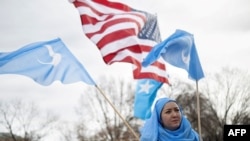Chinese Police Pressure Uyghurs to Spy on Activists Using Threats
Researchers have revealed that China is employing a tactic known as transnational repression (TNR) to pressure Uyghurs living abroad into spying on human rights activists. The Chinese government allegedly uses threats against their families back home to ensure compliance and sets up communication between family members that would otherwise be impossible. One Uyghur refugee in the U.K. shared with the BBC how a Chinese police officer brokered a video call with his mother leaving him torn between being forced to spy on activists or risk harm to his family. The Chinese Embassy in London called the allegations of transnational repression "totally groundless."
Uyghur Woman Detained in Xinjiang for Complaint About Son's Prison Sentence
Rahile Jalalidin, a Uyghur woman, has been detained in Xinjiang after complaining about her son's 15-year prison sentence for alleged illegal travel to Turkey. Despite warnings, Jalalidin, continued to advocate for fair treatment, which might have led to her arrest, as authorities in Xinjiang have a history of imprisoning Uyghurs for actions deemed threatening to national security.
Contrasting Realities in Xinjiang: Economic Growth vs. US Abolition on Forced Labor
Last week, Chinese officials said that Xinjiang is experiencing economic growth with a 65% surge in foreign trade and 5.1% rise in GDP. However, this week, the U.S. added more China-based companies to a blacklist due to concerns of Uyghur forced labor. Battery maker Camel Group along with spice and extract company Chenguang Biotech Group were the latest companies to be included on the entity list of the U.S. government’s Uyghur Forced Labor Prevention Act (UFLPA). In response, the Chinese foreign ministry said, "The so-called 'forced labor' in Xinjiang is a century-old lie concocted by anti-China forces to smear China."
Report: Solar Industry Struggles to Cut Ties with China Amid Uyghur Concerns
According to a recent report, the global solar industry is making efforts to reduce reliance on China due to human rights concerns in Xinjiang, where Uyghurs are allegedly coerced into low-wage jobs. However, the report highlights that despite these efforts, most solar panels still have significant exposure to Chinese labor. Major solar manufacturers, predominantly based in China, run the risk of sourcing materials from Xinjiang, casting doubts on the effectiveness of addressing forced labor concerns in the solar industry. In response to the accusations, China denies mistreatment of the Uyghurs and asserts that they have the freedom to choose whether to work or not.
Uyghur Artist Turned Journalist Finds Solace in Abstract Paintings
Mamatjan Juma, a Uyghur artist and journalist at Radio Free Asia, finds solace in his abstract expressionist paintings as he grapples with the distressing news from his homeland in northwestern China. The oppressive actions of the Chinese Communist Party, particularly the detention of his brothers, according to Juma, drive his determination to be a voice for the voiceless. Juma said that the power of painting lies in its ability to reflect his memories of the Uyghur homeland, capturing his dreams and experiences. For him, art becomes a way to achieve balance and express the beauty and love that can counteract the atrocities he exposes through his work.
Elderly Uyghur Dies in Xinjiang Prison Serving Sentence for Religious 'Offenses'
A Radio Free Asia investigation reveals that Abdurusul Memet, an elderly Uyghur, died in a Xinjiang prison while serving a nearly 14-year sentence. He was arrested in 2017 for studying the Quran as a child and engaging in other religious activities, including praying and having a beard. The Xinjiang Victims Database reported that he had been sentenced for learning the Quran between November 1964 and March 1965. Chinese police confirmed Memet’s death to RFA and stated that he died of hypertension.
News in brief
Uyghur poet Tahir Hamut Izgil shares his journey from persecution to publishing his memoir in Washington. Born in Kashgar during China's Cultural Revolution, he faced challenges, including studying in Beijing during Tiananmen Square protests and being imprisoned amid China's crackdown on Uyghurs. He later sought refuge in the United States. At a book launch event by Penguin Press and Pen America, Izgil presented his latest book, Waiting to Be Arrested at Night: A Uyghur Poet's Memoir of China's Genocide, skillfully translated by Joshua Freeman. The memoir sheds light on the experiences of the Uyghur community and reflects the plight endured amid what the U.S. calls an ongoing genocide in Xinjiang. Izgil's narrative also includes poignant recollections of friend Ilham Tohti's optimistic outlook under Xi Jinping's leadership, later dashed when Tohti was imprisoned. The book is praised as “essential reading” by Ai Weiwei for its powerful documentation of tragic events in Xinjiang and the Uyghur community's struggles. China, however, repeatedly denies any mistreatment of Uyghurs in Xinjiang.
Quote of note
"I realized that betraying others for the sake of my family would mean selling out my nation, and I couldn't do that. If that was the price I had to pay, so be it."




